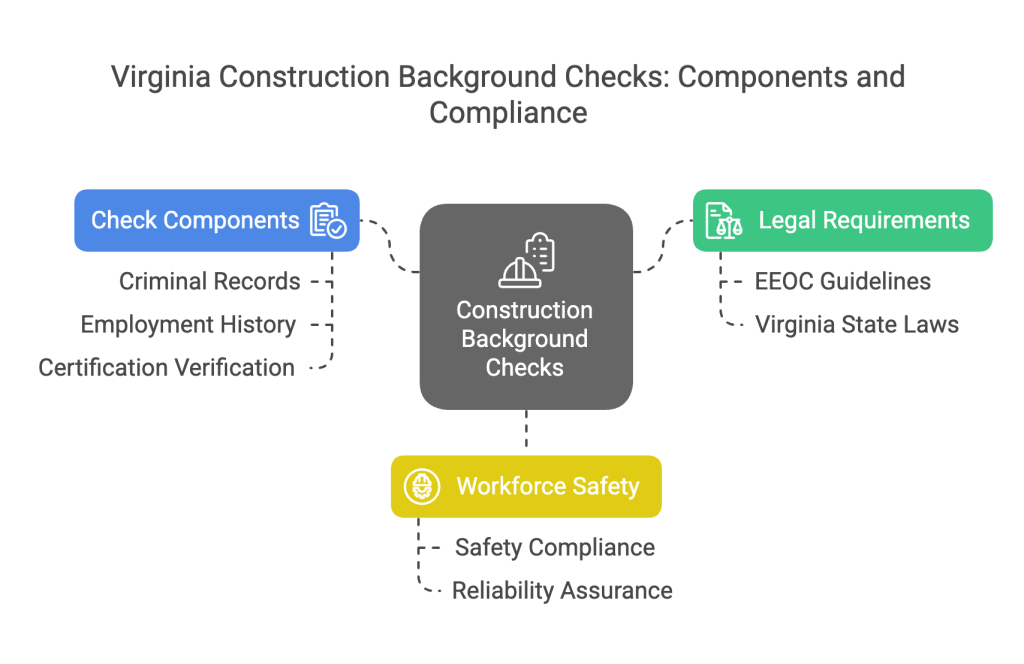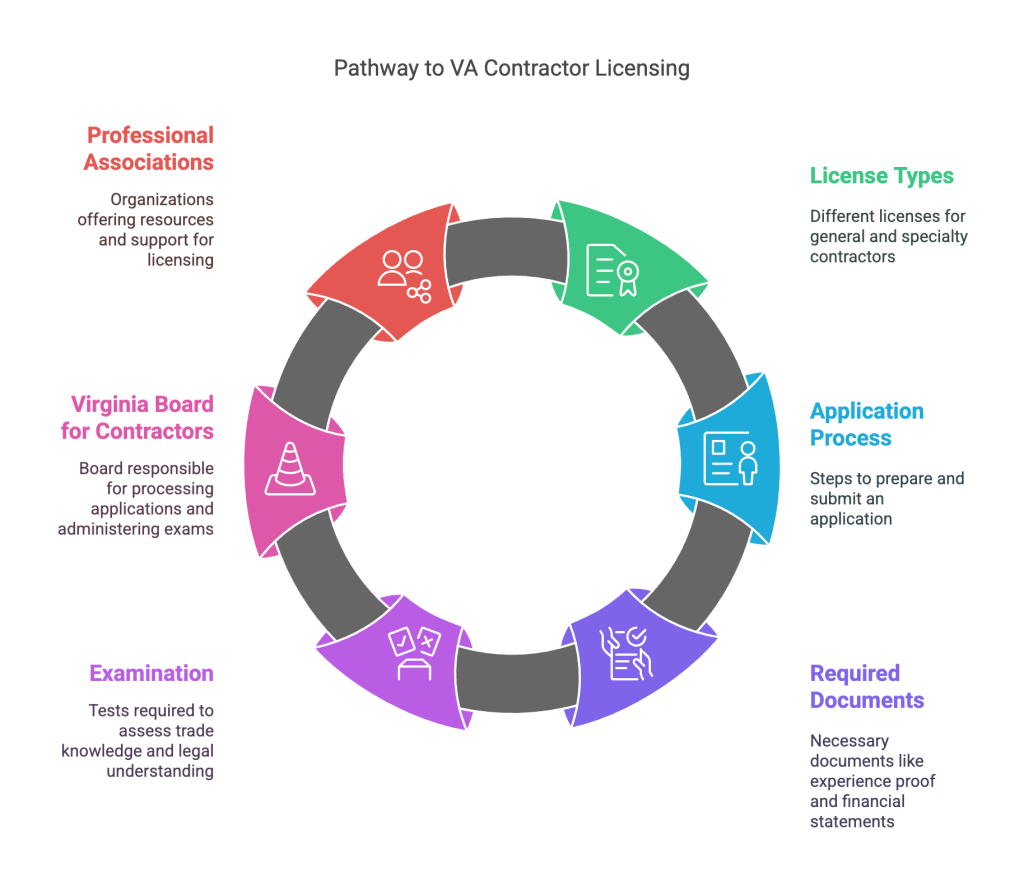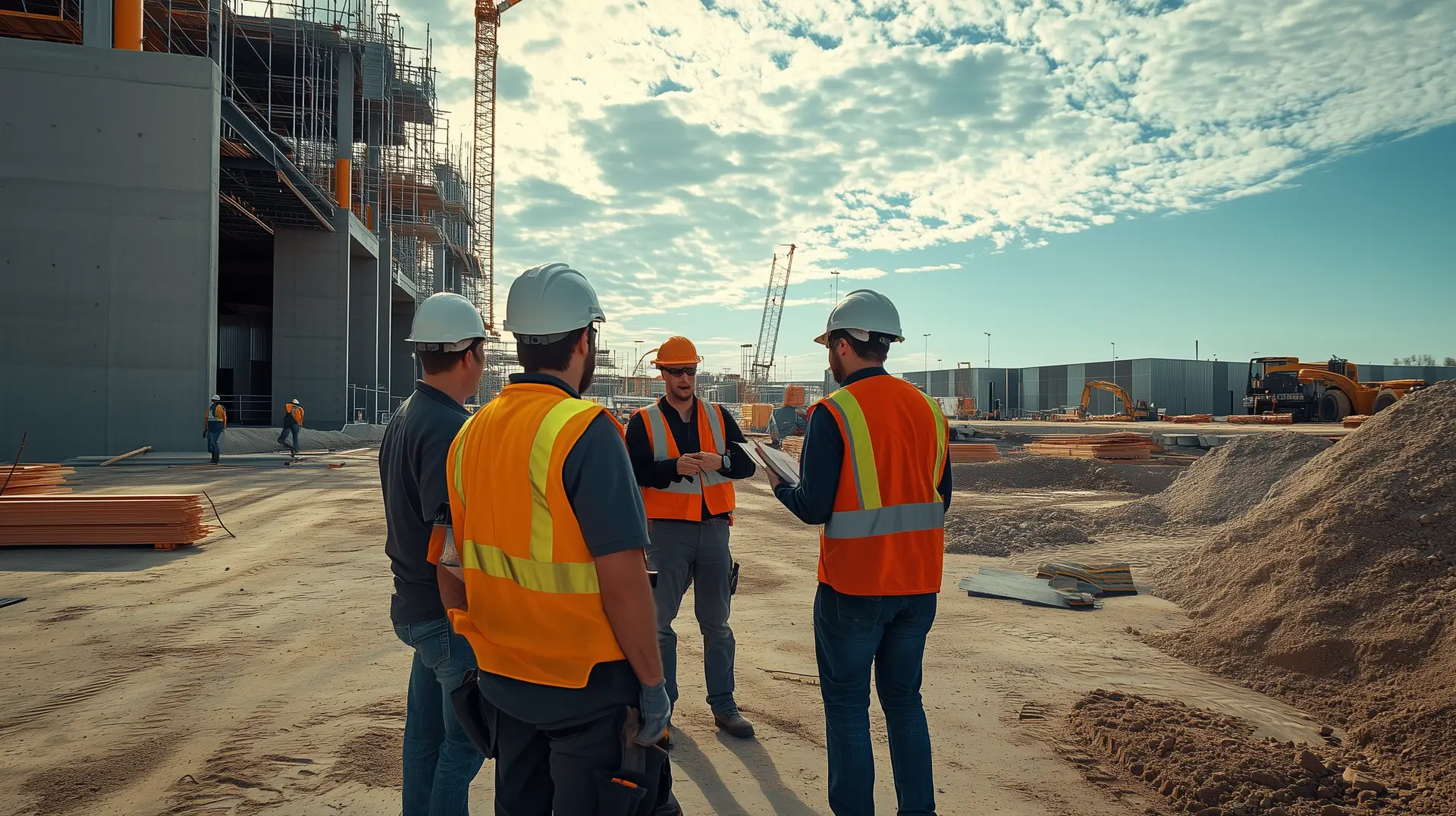Navigating the intricate web of regulations and requirements in the Virginia construction industry can be daunting for both new entrants and experienced contractors. From ensuring compliance with OSHA standards to securing the right licenses, understanding the essentials is crucial for successful operations in the state. This guide demystifies Virginia's construction background checks, focusing on contractor licensing and OSHA compliance, helping you stay informed and legally sound in your endeavors.
Key Takeaways
- Virginia's construction industry is booming, driving the need for strict adherence to safety and legal standards.
- Background checks in Virginia help ensure your team is reliable and safety-compliant, reducing legal and financial risks.
- Obtaining a contractor license is essential for legal operations in Virginia and requires passing exams and gathering specific documentation.
- OSHA compliance in Virginia protects your workers by setting safety standards and helps prevent costly fines and workplace accidents.
- Regular training, detailed documentation, and leveraging technology are key practices to maintain compliance and enhance your company's reputation.
Introduction
The construction industry in Virginia has experienced notable growth over the years. It's a key player in the state's economic landscape, providing jobs and supporting infrastructure development. With this growth comes the interplay of numerous rules and standards aimed at ensuring safety and professionalism. For contractors and workers alike, understanding these requirements is more than just a checkboxâit's a ticket to operating legally and safely.
This guide zeroes in on why getting a handle on Virginia's construction background checks is invaluable. By focusing on contractor licensing and OSHA compliance, you can navigate the complexities of state regulations with confidence. You'll gain insight into the essential checks and balances that support a safe and compliant working environment.
You'll learn what makes up a construction background check in Virginia and why these checks are crucial for building a trustworthy and competent workforce. We'll also cover the licensing process, OSHA requirements, and tools to help you stay on the right side of the law. Whether you're a new contractor in Virginia or a seasoned one looking to brush up on compliance, this guide serves as your essential toolkit.
Understanding Virginia Construction Background Checks
Construction background checks play a critical role in establishing a reliable and safety-compliant workforce. These checks aim to ensure that the individuals working on construction projects meet certain standards of reliability and safety. When you conduct thorough background checks, you reduce the risk of hiring individuals who might pose a danger on the job site or contribute to financial or legal problems down the line.

In Virginia, conducting these checks comes with specific legal requirements. Employers must adhere to guidelines like those from the Equal Employment Opportunity Commission (EEOC). For comprehensive guidance on how to conduct background checks legally, refer to resources such as the EEOC's guidance. This document provides vital information on respecting applicant rights while ensuring workplace safety and compliance.
Typical components of construction background checks include criminal records, employment history, and verification of relevant certifications. Criminal records provide insight into any past convictions that could impact safety or trustworthiness. Employment history checks help confirm that applicants have the necessary experience and track record for the job. Certification verification ensures that workers have the specific skills required, adhering to both safety and technical standards.
When you vet potential hires with these checks, you contribute to a secure and efficient workforce. This practice not only safeguards your projects but also fosters a work environment where safety and reliability are prioritized. What steps will you take to ensure your construction team meets these industry standards?
VA Contractor Licensing
Getting licensed as a contractor in Virginia is crucial for legal operation. Without it, you risk fines, project delays, and a tarnished reputation. The state issues different types of licenses based on the nature and scope of work. There are general contractor licenses for those involved in large construction projects, and specialty contractor licenses for those focusing on specific trades like plumbing or electrical work.
Applying for a VA contractor license involves a clear process. Start by identifying the license that corresponds to your work type. Gather necessary documents such as proof of experience, financial statements, and references. Most licenses will require you to pass an examination that tests your understanding of the trade and relevant laws.
After preparing your application, submit it to the Virginia Board for Contractors. The board not only processes applications but also administers exams. Their website provides detailed information on required fees, upcoming exam dates, and registration deadlines.

For personalized guidance, consider reaching out to the Virginia Board for Contractors directly or consulting with professional associations in your field. These organizations often offer resources and support to help you navigate the licensing landscape effectively.
OSHA Compliance in Virginia
OSHA sets the rules for workplace safety in the construction industry, and understanding these standards is vital. In Virginia, OSHA regulations address everything from fall protection to machinery operation. Ensuring compliance not only helps avoid fines but also protects your workers.
Staying compliant begins with understanding the specific rules. For instance, OSHA requires fall protection for anyone working at heights of six feet or more. This means using guardrails, safety nets, or personal fall arrest systems as needed. Proper protective gear and regular safety training sessions can go a long way in meeting these standards.
Regular site inspections are crucial. Develop a routine check plan that includes reviewing safety equipment and ensuring protocols are followed. For example, inspect scaffolding regularly to confirm it is stable and correctly assembled. Documentation of these inspections is not just good practice; itâs essential for proving compliance if questioned.
OSHA violations can harm both your workforce and your business. Common issues include insufficient fall protection, inadequate hazard communication, and lack of proper respiratory protection. Address these by implementing consistent training focused on these areas. Engaging your workers in safety discussions can improve overall awareness and reduce the likelihood of violations.
Would you know how to spot a potential compliance failure? Sometimes, a simple checklist can help ensure all bases are covered. But compliance is not just a box to check off; it's an ongoing commitment to safety and adherence to established standards. This commitment can be the difference between a safe, productive site and one plagued with unsafe practices and penalties.
Importance of Compliance
In the construction industry, compliance is not just a bureaucratic obligation; it is a linchpin for safety and excellence. Skipping on background checks, licensing, or OSHA compliance can lead to unsafe working conditions and subpar project quality. These checks ensure you hire qualified personnel with the right credentials and clean records, directly impacting the safety and reliability of your workforce.
Ignoring compliance can have dire legal and financial consequences. Non-compliance might lead to hefty fines, penalties, and legal battles that drain resources and damage your bottom line. Your business could face shutdowns or lose its license altogether. Lawsuits from workplace accidents or safety violations can also arise, further complicating your situation.
A rigorous adherence to standards not only keeps you within the bounds of the law but enhances your companyâs reputation. Reliable compliance shows your clients, employees, and partners that you are committed to running a conscientious operation. This trustworthiness can lead to more contracts and partnerships, as companies prefer to work with those who are diligent about regulatory obligations. How are you ensuring compliance within your operations to build a solid and credible business reputation?
Best Practices for Maintaining Compliance
Ongoing education and updates are key. Regular training sessions keep you informed of any changes in legislation and guidelines. Not only do they ensure compliance, but they also enhance your team's knowledge. Schedule these sessions periodically and make them a mandatory part of your operations.
Document everything thoroughly. Having detailed records of your compliance efforts is crucial. Maintain logs of training sessions, inspection records, and any corrective actions taken. Meticulous documentation can protect you in case of an audit or legal scrutiny.
Take advantage of technology. There are various software solutions designed to streamline compliance management. These tools can help track training, ensure timely updates, and maintain comprehensive records. Implementing such technology can save your team time and reduce the risk of errors.
Are you consistently revisiting these practices? Compliance isn't a one-time task. It requires continual attention and improvement. By embedding these strategies into your daily routine, you ensure that your company remains on the right side of the law and promotes a safe work environment.
Conclusion
Staying compliant in Virginia's construction industry requires attention to various regulations, including background checks, contractor licensing, and OSHA standards. Understanding these key elements not only keeps operations legal but also enhances safety and quality. Continually educating yourself about these regulations helps secure your company's future and reputation. Be proactive, stay informed, and foster a culture of compliance to navigate any regulatory trends the industry might face.
Additional Resources
Useful Organizations
- Virginia Department of Professional and Occupational Regulation (DPOR): Offers comprehensive information on contractor licensing and maintaining compliance. Visit their official site for the latest requirements.
- Occupational Safety and Health Administration (OSHA): Their website is a valuable resource for guidelines and training materials related to workplace safety in construction.
Educational Material
- OSHA Training Online: Find a variety of courses and certifications at OSHA Education Center.
- Virginia Construction Career Training Academy (VCCTA): Provides hands-on training and certification programs specific to Virginia's construction industry.
Helpful Articles and Blogs
- GCheck Blog: A great source for updates on background checks and compliance trends. Explore more at GCheck Blog.
- National Association of State Contractors Licensing Agencies (NASCLA): Offers updates and best practices for contractor licensing across states. Check out their resources for detailed guidance.
Legal Guidance
- Equal Employment Opportunity Commission (EEOC): Their detailed guidance on using background checks responsibly can be accessed here.
- Construction Law Handbook: A comprehensive guide to navigating construction law, available in libraries and online bookstores.
These resources offer both foundational knowledge and specific tools to ensure you stay informed and compliant in Virginiaâs construction arena.
Frequently Asked Questions (FAQs)
What disqualifies you from construction work in VA?
Convictions like violent felonies or fraud can disqualify you from construction work. Depending on the nature of the offense, some misdemeanors could also be a factor.
Do VA contractors need background checks?
Yes, contractors in Virginia often undergo background checks to ensure they meet legal and ethical standards.
Can a felony prevent contractor licensing in VA?
Yes, a felony can prevent you from obtaining a contractor license, especially if it relates to fraud or violence.
How often do VA construction sites drug test?
This varies by company. Some conduct random tests, while others test before hiring or in case of accidents.
Are OSHA violations visible on VA checks?
OSHA violations are not typically part of background checks, but they can affect your employment if safety records are requested by employers.
Can you work construction with a DUI in VA?
Yes, you can work in construction with a DUI, though it may impact your ability to operate vehicles.
Do independent contractors need checks in VA?
Not all do, but many clients may request a background check before hiring you as a contractor.
How to verify OSHA certifications in VA?
Contact OSHA directly or visit their website to verify certifications using your certification details.
Are expunged records considered for VA licenses?
Expunged records typically are not considered in the licensing process.
Whatâs the cost of construction checks in Virginia?
Costs vary but can range from $20 to $100 depending on the depth of the check.
Can you apply for a contractor license with outstanding fines in VA?
No, you need to settle any outstanding fines before applying for a license.
Is drug testing mandatory for all construction workers in VA?
Not always, but many companies implement testing policies.
How often does the Virginia Department of Professional and Occupational Regulation (DPOR) update its list of certified contractors?
The DPOR updates its list regularly, though the exact frequency can vary.
Do construction workers in VA need special permits for noise pollution?
Yes, especially if the construction occurs in a residential area, permits are often required.
Definitions
1. Background Checks
Background checks verify a job candidateâs history to ensure they meet safety and legal standards. In construction, they often include criminal record screenings, employment history verification, and certification checks. These reviews help employers reduce risks and build a trustworthy workforce.
2. Contractor Licensing
A contractor license is a state-issued permit allowing professionals to legally perform construction work. In Virginia, contractors must meet experience requirements, pass exams, and submit financial records. Without proper licensing, businesses risk fines and legal penalties.
3. OSHA Compliance
OSHA compliance means following workplace safety regulations set by the Occupational Safety and Health Administration. In construction, this includes proper training, fall protection, and equipment inspections. Failing to follow these rules can lead to accidents, fines, and project delays.
4. Employment History Verification
Employment history verification confirms a job applicantâs past work experience. Employers check previous job titles, dates of employment, and duties to ensure candidates have the necessary skills. This helps prevent dishonest hiring practices and improves workplace reliability.
5. Certification Verification
Certification verification ensures that workers have the required trade-specific qualifications. In construction, this might include checking licenses for electricians, welders, or heavy equipment operators. Verifying these credentials helps maintain safety and legal compliance on job sites.

GCheck Editorial Team
Meet the GCheck Editorial Team, your trusted source for insightful and up-to-date information in the world of employment background checks. Committed to delivering the latest trends, best practices, and industry insights, our team is dedicated to keeping you informed.
With a passion for ensuring accuracy, compliance, and efficiency in background screening, we are your go-to experts in the field. Stay tuned for our comprehensive articles, guides, and analysis, designed to empower businesses and individuals with the knowledge they need to make informed decisions.
At GCheck, we're here to guide you through the complexities of background checks, every step of the way.





